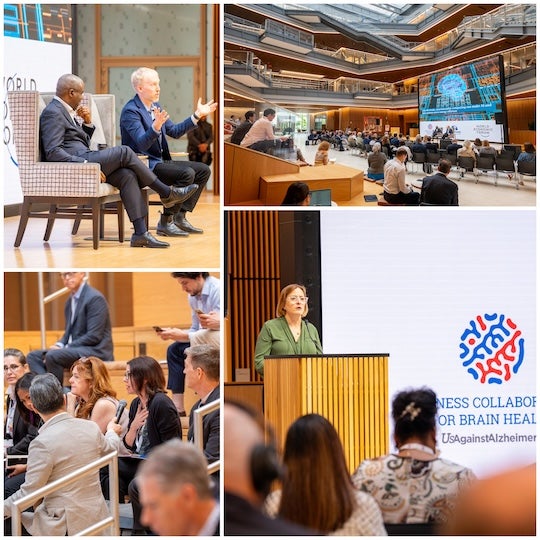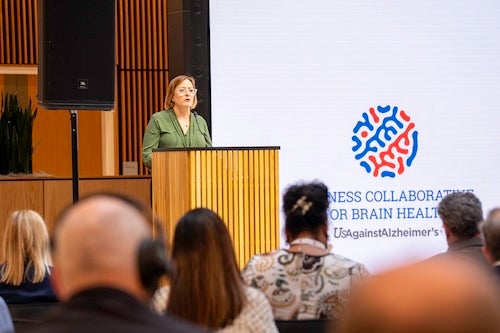The Business Collaborative for Brain Health, an alliance of private sector partners developing effective solutions to optimize cognitive health, hosted a program May 21-22 that brought together experts from two of Houston’s largest industries: energy and health care.
“Negative brain health is a growing crisis,” said Jacob Robinson, professor of electrical and computer engineering and bioengineering at Rice University. “We need solutions around bridging the gap between the current system that incentivizes revenue and one that is incentivized to optimize for wellness. Brain capital is the resource upon which we build our entire society.”
Held at the Texas Medical Center’s Helix Park, the program dove into the topic of “brain capital.” Brain health encompasses the promotion of healthy brain function and the prevention of diseases, while brain capital combines brain health with essential cognitive, emotional and social skills such as critical thinking, creativity, adaptability and empathy. The positive brain economy is a resilient, thriving economic system fueled by healthy brains to meet the growing societal demand for human brain capital.
Amy Dittmar, the Howard R. Hughes Provost and executive vice president for academic affairs at Rice, spoke to the benefits of Houston and how it creates new innovations and discoveries due to the city’s deep roots in industry, health care and academia. Innovations are possible when science, policy and investment align and come together, she said.

“Each of you and your presence here today reflects not only the urgency of the challenge but also this incredible opportunity that is before us, one that can shape the trajectory of our city here in Houston, our state here in Texas, the country and the world,” Dittmar said. “Thanks to strategic public policy, world class biomedical research and international investment, our region is uniquely positioned to lead in the emerging brain economy, and a global transformation is underway.
“I am so proud that Rice has been at the forefront of this movement — advancing the opportunity and call to action around the world with deep talent, a collaborative research ecosystem, much of which we are seeing right here in this building and what is being developed around us today, and bold leadership. Houston has what it takes to become the 21st-century hub for brain health and innovation.”
Rice’s work in neuroscience is multidisciplinary, Dittmar added. The Neuro-Policy Program at Rice’s Baker Institute for Public Policy is helping to shape neuroscience-informed policy from local to national levels. The university’s Neuroengineering Initative brings together the brightest minds in neuroscience, engineering and related fields to improve lives by restoring and extending the capabilities of the human brain. Last year, Rice partnered with Houston Methodist to launch the Center for Neural Systems Restoration to serve as a neurological research and treatment innovation hub.
Many speakers highlighted the work the city of Houston has done with the energy transition and how it can serve as a model to transition to a positive brain economy. Harris Eyre, lead of the Neuro-Policy Program and the Harry Z. Yan and Weiman Gao Senior Fellow in Brain Health at the Baker Institute, had a fireside chat with Lawrence Jones, senior vice president of international programs at Edison Electrical Institute, to examine the parallels of the industries and how the Houston Energy Transition Initiative could be modeled for brain health.
“Houston is really the leading city in the world in neurotechnology,” Eyre said. “We need to think about population level strategies. What are we doing for the entire workforce of companies for example, big multinational companies?
“Investing is very important. We’re not going to achieve this brain economy transition unless we have dollars and cents going into the field. And so interestingly, (Houston will have) the first venture capital fund in the world that’s focused on brain capital. Brain economy is being launched here, and we’ll have all of the portfolio companies here.”
Eyre mentioned that the Texas Legislature recently passed a bill for a $3 billion dementia prevention research institute — the largest amount of financing in the field of brain health globally.
Learn more about Rice's work in neuroscience here.

